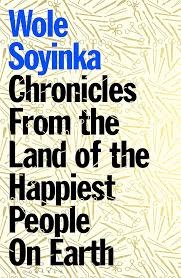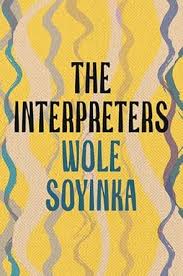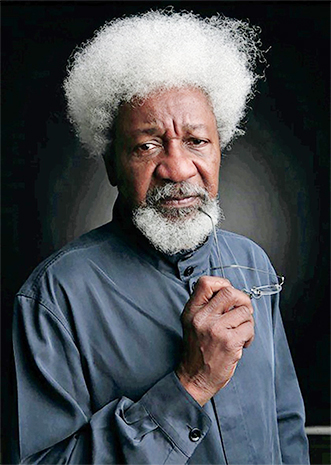Ex Soyinka Semper Aliquid Novi
Wole Soyinka, Historian of the Nigerian Present
Public intellectual, private hunter of game, bibliophile, oenophile, humanist, dramatist, poet, provocateur, paterfamilias: Wole Soyinka has always seemed to inhabit, simultaneously, an endless array of nouns. When he delivered the Herbert Read Memorial Lecture in July 1985, Soyinka was introduced by Lionel Ngakane to the audience at London’s Institute for Contemporary Arts as “a complex man,” hinting at the mercurial character rehearsed above, as well as the protean nature of his artistic gifts. As if to reinforce the point about his catholic range, before the Read lecture began, there was a screening of Soyinka’s film about the 1983 elections in Nigeria, Blues for the Prodigal, described by its director as “a deliberate and contemptuous parody.”
Two months earlier, in May 1985, the ICA, bastion of the cultural avant-garde, had hosted a seminar on postmodernism, attracting a deputation of modish French theorists like Jean-Paul Lyotard, Jacques Leenhardt and Jacques Derrida. One prominent French name, however, was missing: Michel Foucault, historian of the present, had died in June 1984. Culturally amphibious, Soyinka had long been interested in French theatre, but he was more committed to French wine than to French cultural theory. A character in his 1965 novel, The Interpreters, playfully denounces all isms,”from homeopathic Marxism to existentialism.” But Soyinka’s preface to his 1984 farce, A Play of Giants, acknowledged a debt to French playwright Jean Genet. The French deputation at the ICA would have recognised in Soyinka the very model of an engage writer, since in France the public intellectual is by decree of nature a part of the fauna. Soyinka had shown moral courage, like the Sartre who had criticised French colonial rule in Algeria and had gone on the streets of Paris in 1968 to sell revolutionary newspapers outlawed by the government of de Gaulle. Soyinka would also have agreed with Roland Barthes’ assertion that writing is the essential gesture. However, he shared with Foucault a fascination with power, madness and with excavating the history of the present. A country’s history is not merely the portrayed or remembered eras, crises and personages, but equally its eras, crises and personages as seen through a singular artistic temperament across time; a record valuable precisely because it is subjective and sustained. Soyinka’s writing over the past sixty years constitutes arguably the richest and most critical longitudinal portrait of Nigeria’s present.
Soyinka’s writing over the past sixty years constitutes arguably the richest and most critical longitudinal portrait of Nigeria’s present.
At 90, Soyinka is old enough to remember when the women of Abeokuta forced the Alake to abdicate the throne for two years in 1948. He stole away from college in Ibadan to listen to the fiery speeches of the pioneering labour leader, Michael Imoudu, and to watch Hubert Ogunde’s plays. In the months before independence from Britain, Soyinka accosted Prime Minister Tafawa Balewa in the latter’s Paris hotel room to inquire about his plans for the country. His tutor at Leeds University, Arnold Kettle, was known to M!5 as a communist sympathiser; Soyinka himself was tarred by the Balewa government as a “communist,’ in the heady Cold War days when that epithet was either a badge of ideological honour or a reputational death warrant. He spent the civil war years in solitary confinement, deemed so dangerous that even the warders were forbidden from speaking to him. The Man Died, Soyinka’s prison memoir, seethes with indignation, contempt and invective, directed at figures such as ‘...Yisa Adejo, Kam Salem, Femi Okunnu, Remi Ilori…, irredeemable species, varying only in degrees of animality and time-serving.’ His creative impulses and graphomania undimmed, in prison Soyinka scribbled poems on cigarette paper and in between the lines of his book, Idanre, as well as Paul Radin’s Primitive Religion. Opera Wonyosi, his 1977 play, was in Soyinka’s words, a portrait of Nigeria in the 1970s, ‘a society without one redeeming feature.’ In 1985, at the time of the Herbert Read lecture, Soyinka had just resigned his professorship at the University of Ife. The ruling military regime of General Buhari had passed a decree forbidding Nigerian university dons from speaking to the foreign press without official permission. “What can discursive logic do against the monstrous reality of the world?” Jacques Leenhardt had asked at the ICA in May 1985. The Buhari regime had essentially forbidden the exercise of free speech, of discursive logic. For an individual like Soyinka, for whom enforced silence was a kind of social. If not actual death, this was unacceptable. Free speech was not just for Soyinka a civic right: it was, as Roland Barthes might have argued, an ‘essential gesture.’
In 1960 a bureaucrat with literary inclinations who had dutifully subjected the manuscript of Soyinka’s A Dance of the Forests to a Straussian level of close reading alerted the Nigerian government to the actual malice, the ‘deliberate and contemptuous parody’ embodied in the play chosen for performance on Independence Day. Running parallel with the play’s carnivalesque action (‘the gathering of the tribes’) was a mordant warning about ‘repeated cycles of human stupidity’ ; about something rotten, historically, in the state. “ We asked for statesmen. They sent us assassins,” one of the characters notes ruefully. Soyinka was unwilling to suspend his own political disbelief in the name of patriotism, and the government, in cancelling the performance (but not Soyinka’s prize money), resolved not to treat its visiting dignitaries to the spectacle of a state-funded double entendre. It was Soyinka’s first brush with official censorship, and a rehearsal for the adversarial drama of his future relations with the Nigerian state. In London in 1959, the young Soyinka had observed the prodigal delirium of Nigerian parliamentarians attending the pre-independence conference arranged by the British authorities. The pessimism that underlies A Dance of the Forests had its roots in those bacchanalian London scenes. Soyinka’s principled stance in that episode suggested to many that he was an unillusioned thinker, socialist but not doctrinaire; historically aware but valorising neither past nor present; Afrocentric but on his own terms, averse to the full-throated sonorities of negritude. He was cosmopolitan but not rootless, not like the George Steiner for whom a homeland was anywhere with a desk and space to write. Soyinka was neither an academic careerist focused on securing tenure, nor a political climber perched on a series of soapboxes. How had this man, this writer, come to be?
V. S. Naipaul insisted in his essay on Conrad that every great writer is ‘created by a series of special circumstances.’ What, we may ask, are the special circumstances, familial and historical, that created Wole Soyinka? We can begin with the Abeokuta milieu of his formative years, with its fiery, literate clan of Soyinkas and Kutis, its air catholic with Anglican schools and the recital of oriki, Christian fervour and the worship of orisa; with its Yoruba Alake and its British District Officer. We may allude to Soyinka’s presence in the seminal artistic salons of University College, Ibadan, in which also bloomed the talents of Achebe, Clark and Okigbo. We may note also his auspicious move to the literary and ideological hothouse of the English Department of Leeds University, with its hard boiled Marxist Arnold Kettle, the ‘flagrant’ pagan Bonamy Dobree and the great Shakespearean scholar Gerald Wilson Knight.

In 2020 there was palpable excitement in the literary world when it was announced that Soyinka would be publishing his first novel in nearly half a century. Yet to have stated simply that the writer was releasing a new work of fiction would have been to elide the biographically rich and dramatic interregnum between Season of Anomy (1973) and the comet-like appearance of Chronicles From the Land Of the Happiest People on Earth (2020). Published in Soyinka’s 86th year, there was a valedictory resonance to Chronicles. The arrival of a new work of fiction by an aged, aging writer invariably prompts critical solicitude about the timbre of the novelistic voice: about whether it remains measured, magisterial, profound. There is also a certain readerly curiosity about the intimations of greyness, fissures and rust in the novelist’s carapace of style. Each new work in a novelist’s oeuvre is inevitably read in light of what precedes it. Soyinka’s range has been remarkably protean: there is the acerbic and satirical Soyinka of the Jero plays and The Lion and the Jewel; the poetic and cryptic Soyinka of Idanre and A Shuttle in the Crypt; there is the dark, pessimistic Soyinka of Season of Anomy and Madmen and Specialists, the carnivalesque, scathing Soyinka of A Dance of the Forests and Opera Wonyosi. There is the grand, metaphysical Soyinka of The Road and Death and The King’s Horseman, the playfully serious Soyinka of The Interpreters; and finally, the familial, intellectual man-about-the-world revealed in several memoirs from Ake to You Must Set Forth At Dawn. The old Roman axiom suggests itself: ex Soyinka semper aliquid novi.
The late Edward Said gave a series of lectures at his Columbia University perch on “Last Words/Late Style.” Said’s explorations of the subject, published posthumously, focused on ‘works which crown a lifetime of artistic endeavour, invoking Shakespeare’s The Tempest, Ibsen’s When We Dead Awaken and the late poetry of Constantine Cavafy. When Christopher Hitchens reviewed Saul Bellow’s final novel, Ravelstein, published when Bellow was 84, he isolated a single character portrait from the novel and lamented the loss of a certain ‘lapidary’ feature in the novelist’s prose, recalling a time when Bellow could have summoned a ‘less tired’ quality of description. One recalls with exhilaration the portraits of William Einhorn in The Adventures of Augie March or von Humboldt Fleischer in Humboldt’s Gift. Contra Hitchens, another reader of Ravelstein, Martin Amis (high priest of the Bellow admiration society), declared the novel to be of ‘such tremulous and crystalline beauty.’ The Bellow style remained for Amis measured, magisterial and profound, while for Hitchens there were telling fissures in the old Bellovian carapace of style. I recalled Said and Hitchens when I began to read Chronicles and contemplated what the novel would reveal about Soyinka’s late style.

Soyinka’s first novel, The interpreters, began like a semantic puzzle by Noam Chomsky: ‘Metal on concrete jars my drink lobes,’ instantly menacing and intriguing generations of readers with its tenor of a text to be deciphered rather than a story to be discovered. In spite of Soyinka’s protestations that he wrote The Interpreters at a time when he could not work properly in the theatre, his literary bailiwick, there is nothing desultory about the novel. It was described by some reviewers as an existentialist novel, probably because its central characters seemed to move from the nightly watering holes of Lagos and Ibadan to the psychological black holes of professional disillusionment, alienated as they are from the tribal past and the postcolonial present. Biodun Jeyifo argued that The Interpreters was actually a roman a clef about Lagos and Ibadan intellectuals in the 1960s. Yet the novel, if one can labour past its sometimes difficult, occasionally solipsistic prose, presents as vivid and panoramic a portrait of modern Nigeria as anything before or since. The critic Eustace Palmer, whilst praising Soyinka’s themes and his facility with language, alluded to ‘a question mark over his novel’s structural coherence.’ It was telling that in his Introduction to the African Novel, Palmer airbrushed Soyinka from critical consideration. Eldred Jones referred to the profusion of themes in The Interpreters, and was generous in his praise for the literary skill on display. The novel presents a gallery of characters ranging from the intellectual dreamers like Egbo, Sagoe, Sekoni, Bandele and Lasunwon to corrupt bureaucrats like Sir Derin and hypocritical academics like Professor Oguazor, with his affected English accent and his two-faced revulsion at ‘meral terpitude.’ Soyinka had displayed early on a gift for parody and satiric deflation (evident, for instance in ‘Telephone Conversation,’ that poem orphaned by its author and marooned in anthologies and reading lists). Sagoe, one of the titular interpreters, ruefully recognises the nepotistic compensation system that has given the members of his newspaper’s board of directors their positions. They are being rewarded for ‘lost elections, missed nominations, Ministerial-inlawfulness, Ministerial poncing, general arse-licking, Ministerial concubinage.’
Soyinka’s has always been a vocabulary of excess, of polysyllables and figurative surfeit. In an interview with The Guardian several years ago, he recalled being berated by an English don at Leeds for his purple passages, which have retained, a lifetime later, their rich hue. The Interpreters was a carnivalesque novel teeming with coinages, quirks of collocation, Yoruba-inflected metaphors, cartoonish naming, sober spareness, hectic poetry, realistic social observation, pseudo-philosophical parody, interior monologues and authorial asides.It was a thoroughly modernist novel, written by a man who has never been an ascetic user of the English language.

